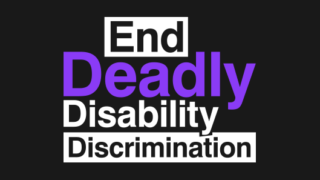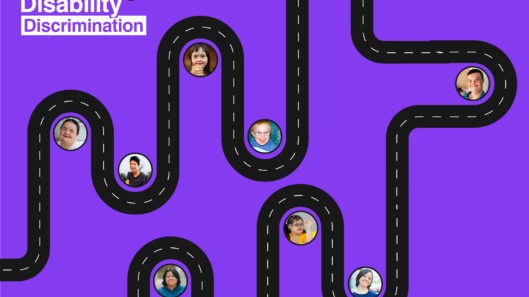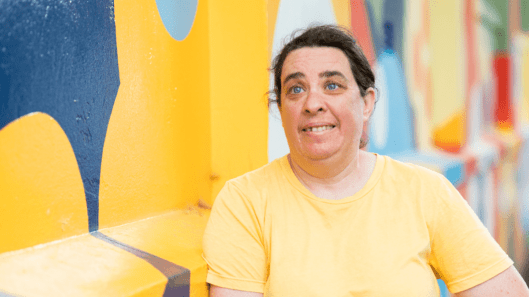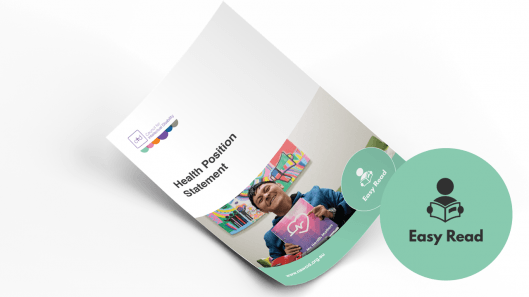Our health system in Australia is failing people with intellectual disability
Research shows people with intellectual disability experience discrimination in hospitals and other health services.
They face big health inequalities compared with the general population.
The evidence is clear. People with intellectual disability are dying up to 27 years earlier than most people and up to half their deaths are preventable.
People with intellectual disability have
- 2.5 times more health problems
- double the use of emergency departments
- double the number of hospital admissions.
Let’s fix this
Following the success of our Our Health Counts campaign in 2019 we worked closely with the Department of Health to develop the National Roadmap for Improving the Health of People with Intellectual Disability.
The Roadmap was launched in August 2021. It outlines a 10-year plan starting from this year, and importantly a lot of the work will be done in the first 3 years.
The Roadmap contains good programs to improve the health of people with intellectual disability.
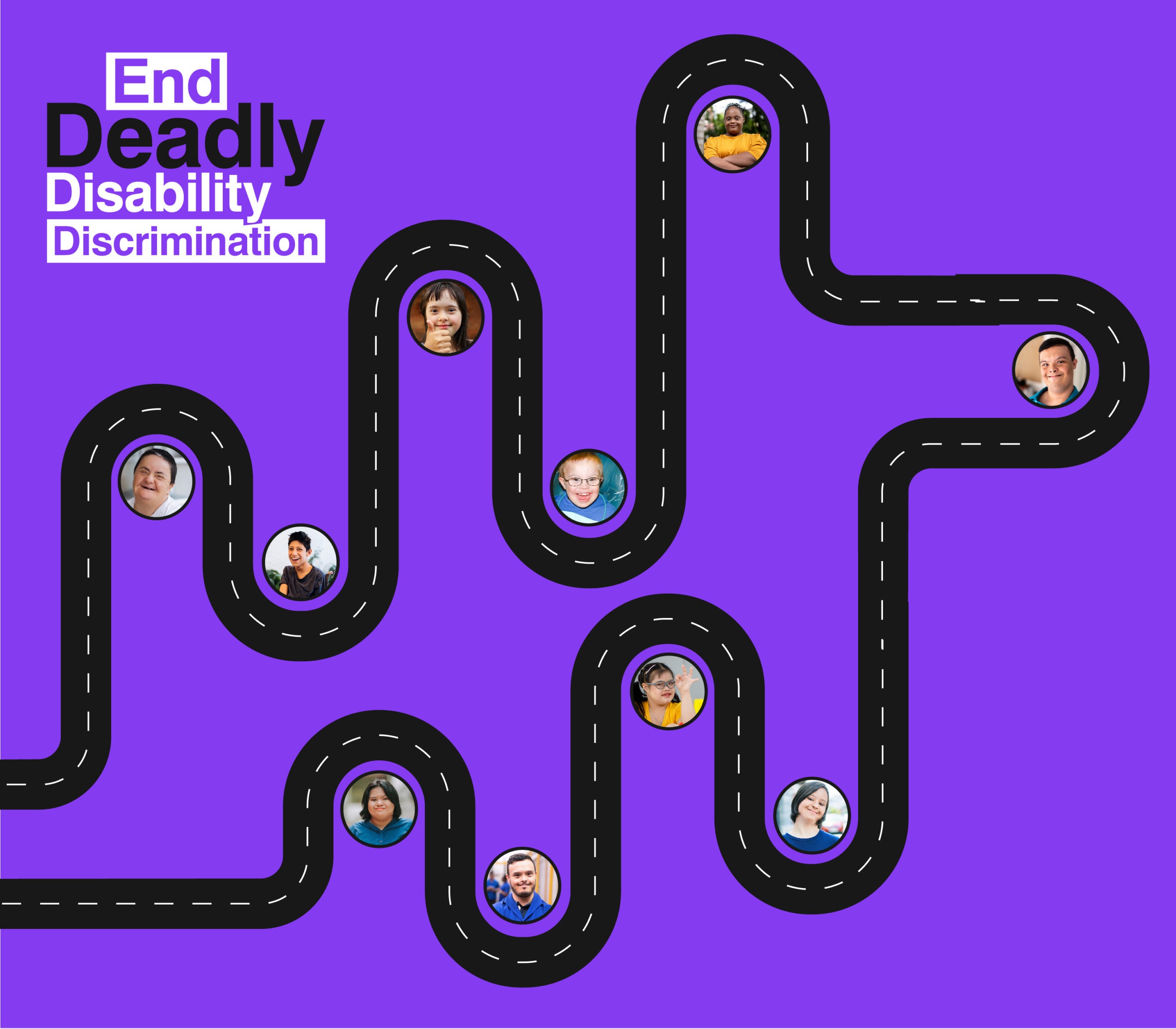
Better trained health workers
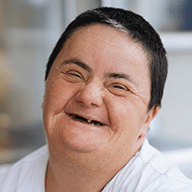
Better trained health workers
Doctors and other health workers get very little training in working with people with intellectual disability. So, they make mistakes.
Informed health care decisions

Informed health care decisions
People with intellectual disability have the right to make their own health decisions, with support from families or advocates if needed. But there is not enough accessible information about health problems and services. Health workers need to be taught inclusive ways to communicate.
Better dental health

Better dental health
People with intellectual disability often have poor dental health. They need better public dental services and from private dentists.
Establishing the National Centre of Excellence

Establishing the National Centre of Excellence
The National Centre is vital to making the Roadmap happen. It will lead research and bring together quality information for people with disability, families and health professionals.
Better health assessments

Better health assessments
Annual GP health assessments lead to better prevention and diagnosis of health conditions. Not nearly enough people get assessments. We need all GPs to do them and do them well.
Better coordination of services
Better coordination of services
Health services need to work together, not individually, with the person who has intellectual disability. Disability services need to support good health, and they need to work together with health services.
Making reasonable adjustments
Making reasonable adjustments
People with intellectual disability need doctors to take more time with them and make reasonable adjustments, like a quiet space in a busy emergency department.
Better research and data
Better research and data
Research and collection of information about how the health system is working shows us what is wrong and how to fix it. We need much more research and data so we can get things right.
Planning for emergencies and pandemics
Planning for emergencies and pandemics
We need to learn from the COVID pandemic to get it right for people with intellectual disability in future health crises.
Better supported health workers
Better supported health workers
Doctors and other health workers often struggle to diagnose and treat people with intellectual disability. They need information on good practice and support from experts to get it right.
The most important part of the Roadmap is the creation of the National Centre of Excellence in Intellectual Disability Health. The Centre is essential to the success of the Roadmap. It will build broader capacity in healthcare. It will give health care professionals the knowledge, skills and right attitudes to provide quality, appropriate and disability-informed health care.
The Coalition Government and now Labor have committed to the Roadmap. When he launched the Roadmap, Health Minister Hunt committed to funding the National Centre of Excellence, however it currently remains unfunded.
What we need now is for Labor, the Coalition and all other parties to commit to the early funding of the Centre of Excellence which will drive Roadmap action.
There will be a federal election in May this year. We need to know that the members of parliament we elect will support the implementation of the Roadmap and the early establishment of the National Centre of Excellence.
The Disability Royal Commission (DRC) made a significant finding that “people with cognitive disability have been and continue to be subject to systemic neglect in the Australian health system.” (DRC’s Interim Report October 2020).
Together we can make sure the National Roadmap with its National Centre of Excellence is fully implemented.
Latest Update: WIN! The National Centre of Excellence is open for business!
Following sustained campaigning by the disability community, on April 20th the Minister for Health, Greg Hunt announced $8 million in funding for the establishment of a National Centre of Excellence in Intellectual Disability Health and an additional $20 million in grants for intellectual disability health research.
We asked Labor to match this funding commitment and on Thursday 21 April they put out a media release announcing that they would be funding the Centre of Excellence. They also confirmed later that they would commit to the $20 million in research grant money.
The Greens are also backing the National Roadmap and funding for the Centre of Excellence.
“A National Centre of Excellence in Intellectual Disability Health will lead much needed improvements to health care for people with intellectual disability. The Centre will work with people with disability and their families to lead developments in health service systems, research and training of health professionals” Professor Julian Trollor, Head of the Department of Developmental Disability Neuropsychiatry at UNSW Sydney, and President of the Australian Association of Developmental Disability Medicine.
“The funding announced by political parties will allow the establishment of a Centre with solid foundations and for important research into practical strategies for improving health care for a very disadvantaged population. While the initial funding of the Centre is only for 2 years, we will be working with government to make it ongoing.” Jim Simpson, CID Senior Advocate.
“How hard have we been fighting for this. I’ve got happy tears running down my face. This is such good news. It is really going to helps us End Deadly Disability Discrimination.” Fiona McKenzie, Chair, Council for Intellectual Disability.
This has been a long and committed campaign to improve the health of people with intellectual disability run by CID with our partners, Inclusion Australia and our collaborators Australian Association of Developmental Disability Medicine, Down Syndrome Australia and UNSW 3DN Department of Developmental Disability Neuropsychiatry.
We say thank you to Minister Greg Hunt, Shadow Minister Mark Butler and The Greens.
But most of all, we say thank you to everyone who has backed this campaign. Your support and commitment will significantly improve the health of people with intellectual disability.
How you can help
- Phone, email and visit your local federal MP (member of parliament) to ask for their commitment to the Roadmap and the National Centre of Excellence.
Open and read the local MP Lobbying kit. - Phone and email Minister Greg Hunt. Thank him for his commitment to the Roadmap and ask him to now commit to the early funding of the National Centre of Excellence.
Open and read Minister Lobbying kit. - Phone and email Shadow Minister Mark Butler. Thank him for his commitment to the Roadmap and ask him to now commit to the early funding of the National Centre of Excellence.
Open and read Shadow Minister Lobbying kit.
More ways you can help
-
Ask us to send you some postcards by post and then ask friends, neighbours and family to sign them and send them to us. Order your printed postcards now.
-
Send an electronic petition postcard. Please fill in the form and an ePostcard will be sent to the Minister and the Shadow Minister.
-
Share our campaign on Facebook, Twitter or your preferred social media using the sharing buttons on this page.
Campaign News
News from our End Deadly Disability Discrimination campaign



 1800 424 065
1800 424 065 














